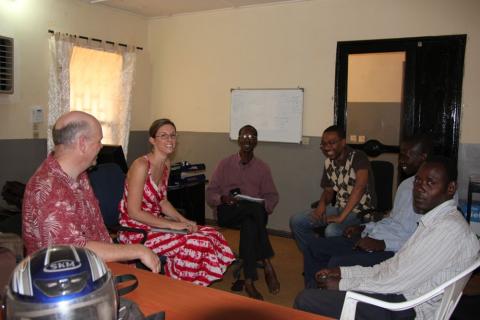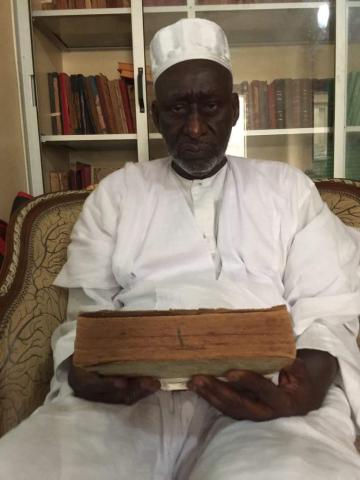
Aims and objectives
This project aims to survey the integrity, uniqueness and value of the documentary material located in the archive of the Prefecture of Bandiagara (Mali), in order to preserve collections of historical and anthropological relevance about the early decades of French colonialism in the region. This archival material falls within the wide area of the Cercle, an administrative unit introduced in 1903 by the French, which came to encompass a territory reaching up to Burkina Faso. Bandiagara is still the capital of the Dogon country, an area of extraordinary cultural interest, included in the UNESCO World Heritage list. Since the region is rich in oral traditions and has few written records, such documents, written in French by the colonial administrators, represent a precious and unique evidence of a historical period so little investigated and consciously removed from the collective memory transmitted across generations. Locating, copying and listing the most valuable and vulnerable collections would be of great attraction for researchers interested in the history, law, religion, anthropology, politics, demography and economy of the region.
The archives of the Cercle have suffered from the harsh environment, and lack of funds, space and skilled personnel. Furthermore, the documents have become even more vulnerable to destruction after the collapse, in 1996, of the ancient palace that hosted them. Before 2005, when the rehabilitation project carried out by the University of Rome "La Sapienza" began, piled on the ground remained the “meagre remains of the history of a people”, as the archivist who witnessed the collapse of the former headquarters defined them. Only a part of these "remains" has been investigated and subjected to a trial digitisation, but this work confirmed the relevance of many documents. Among these: manuscript volumes dedicated to "Audiences Publiques", (1908 - 1943); minutes of proceedings and files relating to "Affaires Musulmanes" (1929 - 1943).
Despite all the measures taken, most of these archival materials still remain unexplored and inaccessible. Inadequate storage conditions persist along with the weakness of a cataloguing system compromised by the collapse of the old palace of the archive. Urgent measures are needed to slow down the process of rapid destruction of the older documents. Based on a previous fieldwork research in the Dogon country, this project will be carried out with the full cooperation of the Prefecture of Bandiagara, even more sensitive to the urgency of safeguarding ancient fonds and collections as a result of a new vulnerability induced by the political, social and religious events recently occurred in Mali. This archival material provides both first-class information about the Cercle of Bandiagara French administration, and an insight on many aspects of local pre-modern life and traditions, in their delicate interaction with the colonial power. They are also of great value in understanding the current administrative and social repercussions of the colonial period, while such context proceeds along a literacy process in which history is disputed between reasons of orality and those of writing.
This pilot project will investigate and identify the most endangered and precious collections dating back to the early decades of the 20th century. Digital copies of already identified collections will be produced (4 manuscript volumes and 2 files), while a survey and a trial digitisation will also be conducted on the un-catalogued documents.
A survey report will be produced to identify these materials and to evaluate the feasibility of a future major project for the preservation of the historical and administrative heritage of the archives of Bandiagara. The documents reviewed will be stored in acid-free boxes and placed on new shelves to better protect them against the rapid deterioration process. A searchable digital catalogue will host data of each examined document.
This procedure will be useful, in the first place, to give priority to the documents to be digitised according to the criteria of historical value and risk of destruction, and secondly to verify their uniqueness by querying the main databases, inside and outside the country, which relate to Mali and the region’s history. For this reason, an investigation will be conducted in the "Archives Nationales du Mali" (Bamako, Mali), while a cross comparison with databases of "Archives Nationales d'Outre-mer" (Aix-en-Provence, France) will be done remotely.
At Bandiagara, the work will include a short training of local staff to encourage sustainable work practices. The master copy of archival material will be deposited in the prefecture of Bandiagara. Copies will be delivered at the Sapienza - University of Rome and at the British Library to ensure broader access of documents for non-commercial purposes.
Outcomes
This project has been successful in achieving a deeper knowledge of the Archives of the Cercle of Bandiagara and a more precise definition of its documentary heritage and consistency. A closer relationship with National Archives of Mali (Bamako) has been established, to prefigure a future collaboration and the necessary measures for a possible major project of preservation and digitisation of the historical collection of the Cercle of Bandiagara
The records copied by this project have been catalogued as:



